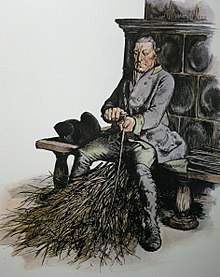Profos (military)

The Profos (also Profoss , formerly Profoss , Provost , Profot ) was a military officer responsible for criminal prosecution and execution of sentences .
The term came from the Middle Dutch provoost (from Latin propositus or praepositus "superior") via the French prévôté around 1500 into early New High German . In the Ancien Régime there was the prévôt .
The provost was in the 16th century with the regimental police commissioned military officer who in his regiment to the enforcement and compliance field order among the mercenaries had to worry about. Until the Thirty Years War , the Profos was assigned to a company or a little ensign and was charged with the execution of disciplinary punishments.
In the Austrian army , the position of profane was exercised by veteran NCOs ("Herr Vater") until 1867, for whom the male servants carried out the corporal punishment. In the old Prussian army up to the reforms of Scharnhorst there was a professional in every regiment who, however, carried out corporal punishment himself (“stick master”) and therefore, like the executioner, exercised an “impure profession” with a very low reputation.
1719 Profose received there as a parody of the soldier king despised French Regency mode gray uniforms with colored badges and white buttons. The general professional as general police master of the army, however, must not be confused with the regimental professional. As a staff officer he wore the normal blue skirt with red badges and yellow metal buttons. Profose also had a higher reputation among the troops of the various imperial districts , which was more in keeping with their position of power. In the United States Army , the Provost Marshal General is still chief of the Criminal Investigation Command .
See also
literature
- General German real encyclopedia for the educated classes. Conversation lexicon; 10th edition 1853, FA Brockhaus Leipzig
- Duden, editions from 5th edition 1897
- Hans Bleckwenn , Die Frederician Uniforms, Volume 4, Osnabrück 1984, p. 51f
